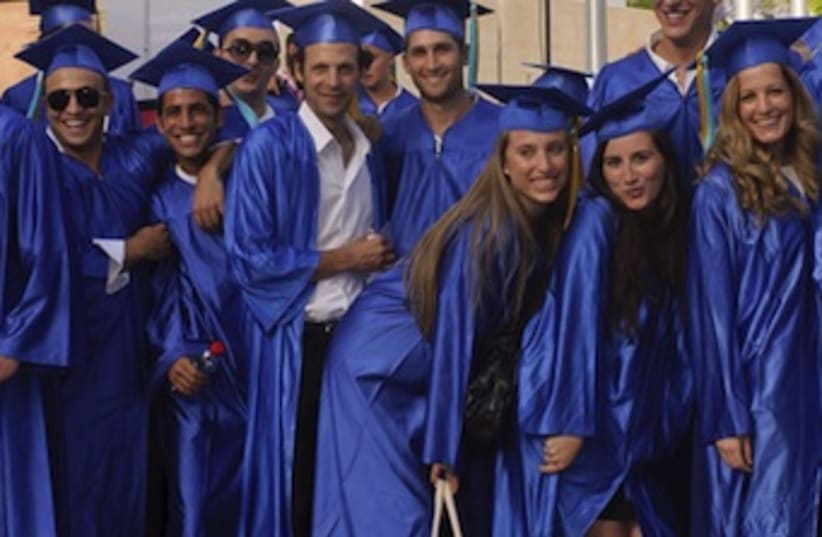The Leah & Naftali Ben-Yehuda Center for Promoting Study Skills held a special tribute ceremony this year for the first time for thirty-four students who mentored sixty other students with learning disabilities. The Center's director, Rachel Thomas-Reznik, said that "this unique project is an expression of the values upon which the Center was created: help; empathy; understanding; personal and social responsibility; volunteerism; personal achievement; creativity; and professionalism." Also present that the evening were: Hava and Shimon Tupor, among the founders of the Center; Dr. Itzhak Oron, the IDC’s Dean for Student Affairs; and Guy Finkelstein, Director of the LaShem Organization for the Academic Advancement of Students with Learning Disabilities.
The Leah & Naftali Ben-Yehuda Center for Promoting Study Skills is a special unit in the Dean for Student Affairs Office. Student mentors impart their charges with learning strategies and efficient and independent study habits. The Center itself offers workshops and a variety of study groups (such as academic writing, debate, etc.), as well as courses on new support technologies, such as special software for time management, reading, and information mapping.
Made up of mostly second year students, mentors may receive credit (social involvement) and a stipend (PERACH, LESHEM/Gross Foundation), or else participate on a purely voluntary basis. They receive professional guidance throughout the year from the Center's staff and are usually paired up with mentees from the same study track so that they will be able to provide them with the relevant skills needed for specific courses.
Speaking on the eve of the ceremony, Shimon and Hava Tupor said, "these kids are going to succeed because they have the drive for success. We've met many very talented people over the years who did not succeed because they lacked what these students have."
"The reactions of mentor and mentored students every year are exciting," Thomas-Reznik told us. "They describe their experience as empowering and significant. I believe that even our 'professionals' couldn't help the mentees as much as the mentors do. The mentoring process is based on a common starting point that facilitates the spontaneous development of techniques and cooperation."
"I would often sit in the classroom and simply not be there; I'd come home wanting to study and prepare myself for the next class, but it didn't work," one first year psychology student related at the ceremony. "I wanted to ask for help and that made me feel weak; I didn’t want to depend on others. Today I understand that weakness is in the eye of the beholder. If I need assistance at this time, it's no problem, because what the academic world considers a weakness is a strength at other points of life."
The mentor who addressed the tribute was a second year student in law and business administration – herself a mentee during her first year. "There are no words that can express how much this process helped me," she said. "My mentor was like a big sister. The tools and support I got from her are irreplaceable. When Rachel suggested that I become a mentor, my first thought was, 'how can I be a mentor when I'm still having trouble implementing these abilities myself?' Finally, I decided that there's nothing to fear, and I mentored two students the following year. In January I was surprised to receive a notice from the Interdisciplinary Center that I was on the Dean's List! It would be impossible to describe the excitement and satisfaction that overwhelmed me after all that coping, investment and perseverance."
Other students who are taking part in the program also shared their experiences of success. One stated that "mentoring saved his degree," and another excitedly stated "I wouldn't have completed the year without my mentor."
In preparation for the exams – some useful study tips from Rachel Thomas-Reznik:
• Make a clear schedule using well-defined and unambiguous targets (mission and execution time).
• Be your own manager. Plan your time in a realistic manner, not an idealistic one. Prioritize!
• Memory = order! Organize and compartmentalize study-material conveniently.
• Active learning. Learning must be active, questions should be asked and curiosity encouraged. Write down notes and thoughts on the lecture notes.
• Practice exam questions. Devote time to practicing different kinds of questions. Learning the material alone is insufficient without monitoring its assimilation and application.
• Questions and instructions. Practice 'cracking' questions so that you can focus on the question's/instruction's purpose. You need to answer the question and not simply relate what you know about the question's topic.
• Time management. Study the form and grading of an exam, so you can plan how much time must be devoted to each part.
• Me time. Don't forget leisure. Devote some time to breathing space between studies and work for social pursuits.
Students interested in participating in the program – whether as mentors or mentees – or who want to assist the Center in its other services are welcome to visit the Leah & Naftali Ben-Yehuda Center for Promoting Study Skills internet site at www.idc.ac.il/ssc, where application forms are available. You may also contact Shirley Menda at smenda@idc.ac.il or by phone +972 9 9602872.
